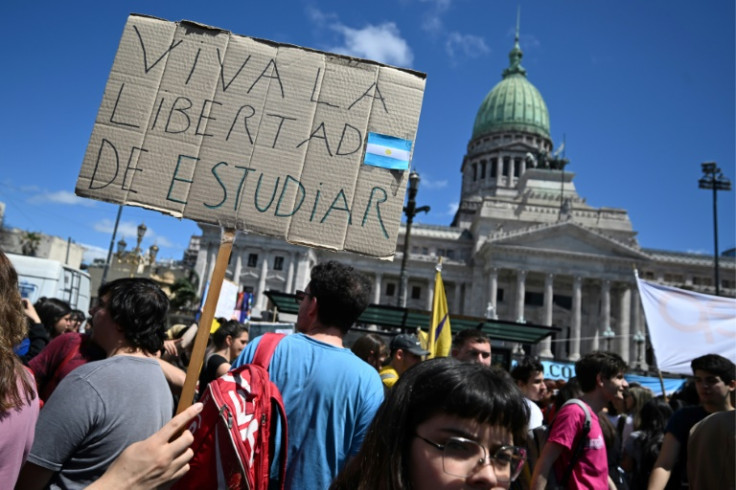
Argentine lawmakers on Wednesday upheld President Javier Milei's veto of funding increases for public universities, handing him a key victory in his months-long standoff with teachers and students.
Milei last week vetoed a law approved by the Senate that envisaged regular funding increases for public universities, whose budgets have been slashed by the libertarian president.
The law also provided for university teachers and other staff to receive pay increases to offset the effects of perennially high inflation, which stood at 236 percent in August.
Members of the lower house of Congress ratified the veto by a narrow margin, even though hundreds of thousands of Argentines took to the streets over the past six months in support of the country's cherished fee-free public universities.
Wednesday's vote marks the second major win in a month for self-described "anarcho-capitalist" President Milei, who came to power in December vowing to take a chainsaw to public spending.
Lawmakers on September 11 had already ratified his veto of an increase in pensions.
Unions representing teachers and non-teaching staff at the University of Buenos Aires (UBA) announced they would go on strike Thursday over the "shameful" vote by Congress members, which they said "put the future of a whole country on the line".
Tensions ran high outside Congress, where hundreds of demonstrators, including students and pensioners, staged a protest under a heavy police presence.
"You can't veto our future," read a placard held by one of the demonstrators.
"Education means a lot to me. It means equality of opportunity," Camila Flores, a 20-year-old psychology student at UBA, which has produced five Nobel laureates, told AFP.
The opposition needed a two-thirds majority of members of both houses of Congress to reject Milei's veto but fell short by six votes in the lower Chamber of Deputies.
Around 80 percent of all Argentines who attend higher-level education enroll in the public university system, which Milei has criticised as a hotbed of Socialist indoctrination.
Opposition senator Martin Lousteau accused Congress after the vote of "turning its back on a society that, across the country, has made it clear it is in favour of public university education."
"They have awakened a sleeping giant," Ilana Yablonovsky, a 27-year-old literature student who has joined a sit-in at UBA's philosophy and literature faculty, told AFP.
"This is not the end, it is the beginning," she vowed.
Milei is on a mission to erase Argentina's budget deficit.
The government's draft 2025 budget proposes giving universities half of what they say they need to operate.
On Tuesday, the Ministry of Human Capital attempted to appease the universities, announcing a 6.8 percent increase in teachers' salaries.
Teachers' unions rejected the raise as insufficient.
Milei's dose of shock therapy for Argentina's long-ailing economy has had mixed results.
While inflation and the budget deficit have fallen, his tough austerity measures have been blamed for a dramatic increase in poverty levels.







